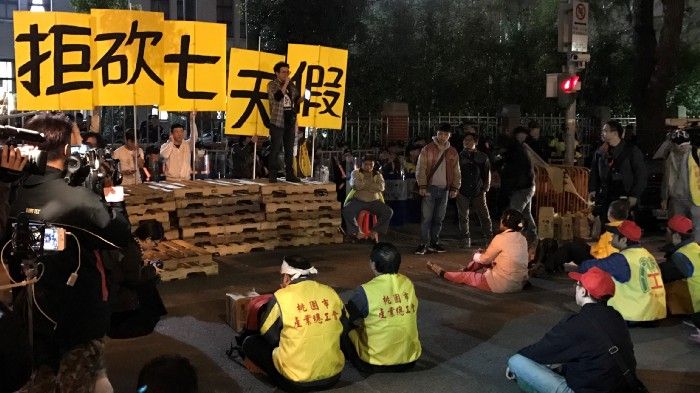[Next Magazine] Controversy over the revision of the law highlights Xiaoying's character without speaking clearly

Regarding the revision of the "Labor Base Law", before this year's election, Tsai Ing-wen, who was the presidential candidate of the Democratic Progressive Party at the time, vowed to emphasize when meeting with the labor union, "Adhering to the substantive two-day rest, it cannot be changed because of the system change. The implementation of two days off on weekends has resulted in the reduction of the real rights of laborers.” He also mentioned that “the law of (deleting) the seven-day leave will not let it pass until the package is not complete.” Promise of.
As a result of the revision of the law, two days off each week became one case and one off, and the seven-day leave was also cut off, causing Tsai Ing-wen to be immediately questioned for violating her promise to voters. But why is the DPP still escorting Tsai Ing-wen?
DPP legislator Chung Kong-shao said: "The amendment to the law of one rest and one rest will allow bosses to pay more overtime pay to workers on rest days. If they don't want to pay, then workers will have two days off every week, and they have not broken their promises." Some people questioned, If the boss asks the workers to work on a rest day, won't they have two days off each week? Zhong Kongshao said that the most important thing is to implement labor inspections, whistleblower lines, and whistleblower clauses, so that workers can refuse to work overtime.
Fuzzy before election, indecision after election
In terms of the seven-day leave, Zhong Kongshao also clarified that Tsai Ing-wen did not say that the seven-day leave would not be cut, but that the existing rights and interests should be retained before the package is available, and the national holidays will be the same after the package comes out.
However, Jiang Wanan, a legislator of the Kuomintang, believes that whether it is two days off a week or seven days off, it is to solve the problem of overwork. The latter measures still harmed labor rights and interests. For example, taking a break just exchanged money for blood and sweat, and did not solve the problem of overwork.
Hong Ciyong, a legislator of Times Power, also believes that it can be discussed whether to cut the seven-day leave, but it cannot be cut for the sake of cutting, and the national leave should be reviewed. It can be seen from the process of law revision that it was too hasty. When the top leaders of the ruling party said what to do, the Ministry of Labor cooperated, and did not do its own analysis and evaluation.
Regarding national holidays, Zhong Kongshao believes that there will be opportunities for adjustment in the future. Some holidays left by the authoritarian era should also be thoroughly reviewed. After the review, it may not be the existing 12 days, but it may be 13 days or 15 days... It's just that at this stage, the whole country must be unified, and there should not be a chaotic scene in which only laborers are on holiday and teachers are not on Teacher's Day. However, Hong Ciyong also said that after the third reading of the "Labor Standards Law", Times Power put forward an accompanying resolution, requiring the executive branch to send the National Holiday Amendment Act to the Legislative Yuan for deliberation within three months, but the proposal was also blocked.
It's really good to be President Cai
Chen Zhengliang, an associate professor at the Institute of Social Development at Shih Hsin University, showed data that the revision of the law did not reduce working hours.
On the issue of same-sex marriage, Tsai Ing-wen has also been criticized for violating her pre-election promises. On December 10, supporters of same-sex marriages called for 250,000 people to take to the streets and shouted slogans such as "oppose separate legislation", once again challenging the Tsai Ing-wen government's ambiguous and contradictory stance in the process of amending the law.
You Meimei, the legislator who proposed to amend the "Civil Law", has repeatedly reiterated that amending the "Civil Law" is the easiest way; Kuomintang legislator Xu Yuren has also mentioned many times before that imitating the German legislative special law will only waste more government resources in fighting. lawsuit. However, Zhao Tianlin, a legislator who advocates the special law, said that the special law is a balance point. He expects to raise the special law in the next session to create more discussions. He also does not agree that the special law is discrimination. Zhao Tianlin said that Tsai Ing-wen did not promise to realize marriage equality by revising the civil law from the beginning.
However, Tsai Ing-wen only reiterated through a spokesperson that "there should be enough room for discussion", which made Hong Shenhan, deputy secretary-general of the Green Citizens Action Alliance, criticized, "The president is really good." Same-sex marriage was Tsai Ing-wen's election. I have political views, but I did not make it clear from the beginning to the end of my own ideas and the path of implementation.
Tsai Ing-wen's personality dictates that pre-election promises always set a bunch of premise and expand the space for vague explanations. If Tsai doesn't change his thinking, every time in the future, every time he faces the test of whether election political views are bouncing, the government and the opposition will continue to stage "separate opinions". Expression" of the absurd plot.
Like my work? Don't forget to support and clap, let me know that you are with me on the road of creation. Keep this enthusiasm together!

- Author
- More